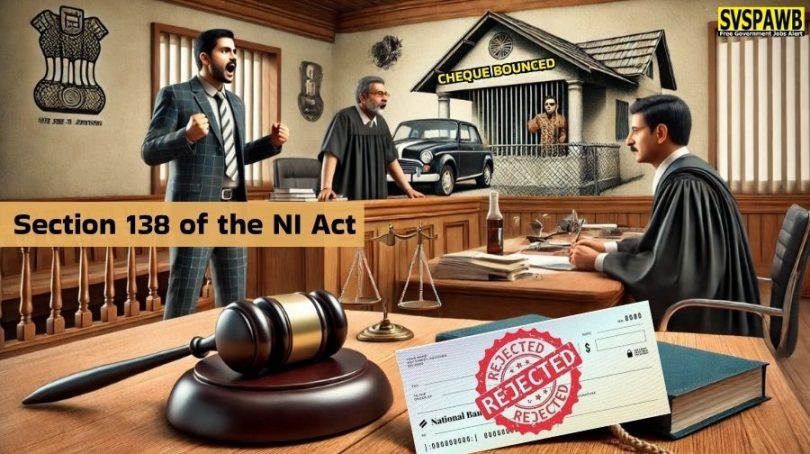Today, we will discuss Section 138 of the NI Act (Negotiable Instruments Act) and other important provisions related to cheque bounce and cheque bounce notice. Cheques are widely used worldwide for payment of bills, salaries, school fees, etc. However, sometimes, cheques are dishonored due to some technical reasons, which is called cheque bounce.
What is Section 138 of the NI Act?
Section 138 of the NI Act provides for penalty for cheque bounce.
Section 138 was added to the Negotiable Instruments Act 1881 as a result of the Banking, Public Financial Institutions and Negotiable Instruments (Amendment) Act, 1988.
The amendment was aimed at regulating financial transactions in business, trade and industrial activities in the country and enforcing strict laws to enhance surveillance in financial matters.
What is a cheque?
A cheque is a document issued by a person instructing his bank to pay the person in whose name the cheque is issued.
What is a cheque bounce?
When a bank returns a cheque without paying it, it is called a cheque bounce or dishonored cheque. Cheque bounce can occur for various reasons. When a cheque bounces for the first time, the bank issues a ‘Cheque Return Memo’ stating the reason for the bounce.
When does Section 138 of the NI Act apply when a cheque bounces?
The following are the essential elements for the commission of an offence under Section 138 of the NI Act:
- A person issues a cheque in favour of another person for the full or partial payment of a debt or other liability.
- The cheque must be presented to the bank for payment within the period of its validity, i.e. within three months from the date of the cheque.
- The cheque is liable to be cancelled for the following two reasons: Insufficient funds in the bank account and the value of the cheque is more than the amount payable from the account agreed with the bank.
- The payee, by a written notice, asks the drawer/issuer to pay the amount of the cheque within 15 days of receiving the notice of cancellation of the cheque.
- The drawer fails to pay the amount of the cheque within 15 days of receiving the notice.
Reasons for cheque bounce or dishonor
There are several reasons for cheque bounce or dishonor, including:
- Expiration of cheque: A cheque is valid for only three months from the date of issue. After this period, if the cheque is presented to the bank, it is bounced or dishonored.
- Wrong bank account number: Wrong writing of the bank account number on the cheque.
- Spelling mismatch: Mismatch between the letters and numbers on the cheque.
- Signature mismatch: Signature on the cheque does not match the official bank document.
- Overwriting: Obvious overwriting on the cheque.
- Bank Account Closure: Cheque may bounce if the account holder has closed their account or the bank closes their account.
- Company Stamp Missing: If the cheque is issued by a company, the cheque may not have the company stamp.
- Drawer/Issuer Insanity: The drawer/issuer becomes mentally ill.
- Drawer/Issuer Insolvency: A cheque is bounced or dishonored by the bank when the drawer/issuer becomes insolvent.
- Non-compliance with the terms of trust: Non-compliance with the terms of trust: A cheque is issued against the terms of the trust.
- Genuineness of doubtful cheque: If the bank doubts the genuineness of the cheque.
- Insufficient funds: When there are insufficient funds in the account of the cheque issuer.
What is the procedure for filing a cheque bounce case under NI Act?
The procedure for filing a cheque bounce case in India is as follows:
- Sending a demand notice to the person who issued the bounced cheque.
- This notice must include all the information about the bounced check, such as the date of issue, bounced check number, etc.
- Give the recipient of the notice time to pay within 15 days from the date of receipt of the notice.
- If the amount of the check is not paid within 15 days of the notice, file a case in the Magistrate’s Court under the jurisdiction of the bank.
- Affirm the cheque bounce application with the affidavit, original cheque and return memo, a copy of the notice, postal receipt and an affidavit of evidence.
- The court will analyze your application and take it into consideration.
- After taking it into consideration, the court will issue a summons to the defendant to appear.
- The complainant, assisted by his lawyer, will present evidence in the court.
- After both parties appear and present evidence and witnesses, the lawyers for both sides present their final arguments. This is usually the final stage before the court takes a decision.
- The court delivers its decision after hearing the arguments of both parties based on the court proceedings, the facts of the case, and the circumstances.
What is a demand notice for cheque bounce?
A demand notice under Section 138 of the NI Act is a notice sent by the payee of a cheque to the drawer informing him of the cheque bounce and demanding payment of the amount of the cheque.
When is a demand notice sent in case of cheque bounce?
A demand notice should be sent within 15 days from the date of receipt of the cheque bounce notice from the bank.
When is a demand notice sent in case of cheque bounce?
A demand notice must be sent within 15 days from the date of receipt of the cheque bounce notice from the bank.
Documents required to file a cheque bounce case
The following documents are required to file a cheque bounce case:
- Original cheque and return memo.
- Copy of the notice and original postal receipt.
- Affidavit.
- Aadhaar card.
- Two passport size photographs.
- Power of attorney.
- Cheque bounce form.
Where can a cheque bounce case be filed?
A case of cheque bounce should be filed in the court under whose jurisdiction the bank where the cheque was presented for payment is located.
How to file a police complaint for cheque bounce?
It is important to know that although cheque bounce is a crime in India, it does not require a police report. Instead, there is a provision to file a case under Section 138 of the N.I. Act in the concerned Magistrate’s Court.
Is Section 138 of the NI Act civil or criminal?
Section 138 is criminal in nature. However, in the case of cheque bounce, in addition to the N.I. Act, a case can be filed under the Indian Penal Code and the Code of Civil Procedure.
Other options for cheque bounce besides Section 138 of the NI Act
In the case of cheque bounce, N.I. Apart from Section 138 of the Act, the following alternative remedies exist:
Civil case for cheque bounce: The complainant can also file a case under Order 37 of the Code of Civil Procedure for recovery of the amount due, especially when the amount is small.
Criminal case under Section 318 of the Indian Penal Code: In serious cases where the amount of the cheque is high and applicable, a criminal case for cheating under Section 318 of the Indian Penal Code (IPC) can also be filed.
Interim compensation to the complainant under Section 143-A of the National Investigation Agency (NIA) Act
This section provides for the court to obtain interim compensation of 20% of the amount of the bounced cheque from the person who issued the cheque to the complainant.
Liability of directors in case of cheque bounce of a company
When a cheque is bounced by a company, the director of that company can be held liable under section 141 of the National Investigation Agency Act, 1881. According to this Act, the director, in-charge and every person who was responsible for the business of the company at the time of the offence shall be liable with the company.
Draft of Cheque Bounce Demand Notice
To,
(Name and Address of Opposite Party)
Sir,
At the request of my client (Name and Address of Party), I am giving you the following legal notice:
You have issued a cheque number ………….. (Bank name and address) dated (Date of cheque) to my client for (Amount of cheque) in respect of the balance payment for (Details of goods or merchandise) from the above firm of my client and have assured my client that the amount mentioned in the above cheque will be paid in any circumstances.
The above mentioned cheque was presented by my client to his bank at ………………… (name and address of bank) and was returned on ………….. with the remark (insufficient funds).
When my client contacted you in this regard, you did not give a satisfactory reply or pay the amount mentioned in the cheque.
When my client contacted you in this regard, you did not give a satisfactory reply or pay the amount mentioned in the cheque. Your actions appear to indicate that you do not wish to pay for the goods (detail of goods) purchased from my client. Due to this, you issued the above mentioned cheque, which was returned unpaid despite there being insufficient funds in your bank account.
This act of yours is a punishable offence under Section 138 of the NI Act, and the court may punish you with a fine of twice the amount mentioned in the cheque and imprisonment.
Therefore, you are hereby strictly directed to pay the amount mentioned in the above cheque to my client in cash and accept the cheque within 15 days of receipt of this notice, failing which, on expiry of the period, my client will be compelled to initiate legal action against you in the appropriate court, for which you will be liable for all costs and consequences. Additionally, you will be required to pay ₹5,000 towards the cost of this legal notice.
Yours sincerely,
(Name of the Law)
Conclusion:
If someone has given you a bounced cheque, or if someone has filed a cheque bounce case against you, you should know both your rights and options. While the case under Section 138 can be serious, resolution is possible if you seek timely legal advice and take action. If you need any advice regarding cheque bounce – whether you are the victim or the accused – speak to our lawyers immediately.
Read more articles…








